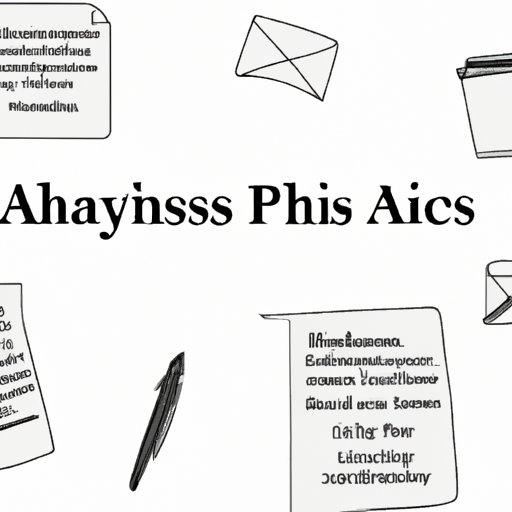
I. Introduction
The Advanced Placement Language and Composition exam is designed to test your proficiency in reading and writing effectively. One of the key components of this exam is the rhetorical analysis essay, where you analyze a given text to deduce the speaker’s purpose, target audience, and use of persuasive techniques. Writing a rhetorical analysis essay requires a structured approach, knowledge of various persuasive techniques, and a keen eye for detail. This article will provide you with expert tips and strategies on how to write an effective rhetorical analysis essay for the AP Lang exam.
II. Tips for Writing an Effective Rhetorical Analysis Essay
In order to write an effective rhetorical analysis essay, you need to follow certain guidelines. Here are some tips to help you get started:
Identify the speaker’s purpose
Before you begin writing your essay, you need to identify the speaker’s purpose. Ask yourself questions such as: Why did the speaker decide to give this speech or write this text? What is the speaker trying to accomplish? What message is the speaker attempting to convey? Identifying the speaker’s purpose will help you understand the text thoroughly and provide you with insight into the target audience.
Analyze the target audience
It’s important to analyze the target audience to write a winning rhetorical analysis essay. Ask yourself: Who is the intended audience? What characteristics would they have? What do they stand to gain or lose from the speaker’s message? By analyzing the target audience, you can understand the text better and write a more effective essay.
Analyze the speaker’s use of rhetorical devices
Rhetorical devices are employed by speakers to emphasize their message and engage the audience. Analyze and identify the different rhetorical devices used by the speaker, including metaphors, alliteration, imagery, and other literary techniques. You can also analyze the tone, style, and diction used by the speaker to make the speech more persuasive.
Use appropriate vocabulary
When writing a rhetorical analysis essay, it’s important to use appropriate vocabulary to convey your message effectively. Use technical terms and concepts related to persuasive techniques, such as ethos, pathos, logos, speaker, message, audience, and rhetorical strategies.
Organize your essay effectively
Organizing your essay effectively is crucial when writing a rhetorical analysis essay. Use a clear and concise thesis to express the focus of your essay. Divide your essay into introduction, body, and conclusion. Use evidence from the text to support your arguments in the body of the essay, and summarize your key points in the conclusion.
III. Breaking Down Persuasive Techniques in a Rhetorical Analysis Essay
Persuasive techniques are an integral part of a rhetorical analysis essay. There are three types of persuasive techniques that you need to be familiar with: ethos, pathos, and logos.
Introduction to Persuasive Techniques
Persuasive techniques are used by speakers to convince the audience to agree with their viewpoint. Ethos, pathos, and logos are the three different types of persuasive strategies used to persuade the audience.
Detailed Explanation of Ethos, Pathos, and Logos
Ethos refers to the credibility of the speaker. It is the use of the speaker’s reputation or authority to persuade the audience. Pathos is the use of emotions and feelings to appeal to the audience. Logos is the use of reason and evidence to persuade the audience.
Examples of How to Identify Persuasive Techniques in a Rhetorical Analysis Essay
For example, if the speaker is talking about climate change and uses terms like “we stand at a critical point” and “our planet is in peril,” he or she is using pathos. If the speaker cites scientific evidence and statistics on climate change, he or she is using logos. If the speaker mentions his or her background in studying environmental science, he or she is using ethos.

IV. Best Practices and Expert Tips for Mastering Rhetorical Analysis Writing
Here are some expert tips to help you master the art of rhetorical analysis essay writing:
The Importance of Practice and Preparation
Practice makes perfect, and preparing properly is key to writing a successful rhetorical analysis essay. Take a practice test to get comfortable with the format and structure of the essay. Study the different persuasive techniques and practice identifying them.
Tips for Organizing and Structuring an Essay
Organizing and structuring your essay is crucial. Use a clear, concise thesis statement to express the focus of your essay. Break down the body of the essay into paragraphs, each focused on a different persuasive technique used by the speaker. End with a conclusion that summarizes your main points.
Common Pitfalls to Avoid
Common pitfalls in rhetorical analysis essay writing include failing to identify the speaker’s purpose, not analyzing the target audience, and not organizing the essay effectively. You should also avoid summarizing the text – instead, focus on analyzing it.
Expert Advice on Writing a Successful Rhetorical Analysis Essay
Expert advice includes reading the text multiple times to understand it completely, identifying the main thesis of the speech and the supporting claims, and examining the persuasive techniques used by the speaker. Use examples and evidence from the text to support your arguments and write a compelling essay.
V. Crafting a Winning Rhetorical Analysis Essay
To craft a winning rhetorical analysis essay, use these tips:
How to Choose Your Topic
Choose a topic that you are familiar with and that you find interesting. If you’re passionate about environmental issues, choose a text related to the environment.
How to Write an Effective Thesis Statement
Your thesis statement should be clear and concise, indicating the focus of your essay. Make sure your thesis statement includes the persuasive technique(s) used by the speaker and the targeted audience.
The Importance of Evidence and Analysis
Use evidence from the text to support your arguments and analyze how the persuasive techniques are used. Use quotes and examples to reinforce your thesis statement and make your points more compelling.
Tips for Revising and Editing Your Essay
Revise and edit your essay for clarity, coherence, and grammar. Check for spelling errors and sentence structure. Make sure your essay flows logically and that your arguments are well-supported.
VI. Strategies for Writing a Compelling Rhetorical Analysis Essay
To write a compelling rhetorical analysis essay, use the following strategies:
Tips for Brainstorming and Organizing Ideas
Organize your ideas by focusing on the persuasive techniques used in the text. Identify the main ideas and supporting points you want to make and group them together.
Advice on Using Transitions Between Paragraphs
Use transitional words and phrases to connect your ideas and paragraphs together. These could include “furthermore,” “in addition,” “similarly,” and “consequently.”
Examples of Successful Rhetorical Analysis Essay Introductions and Conclusions
Introduce your essay by providing context and background information about the text. Summarize your arguments in the conclusion and make a final statement, reinforcing your thesis.
VII. Acing Your Way Through Rhetorical Analysis Essay Writing
To ace your way through rhetorical analysis essay writing, use these tips:
Tips on Time Management
Manage your time properly by allocating sufficient time for reading, analyzing, and writing. Aim to finish the essay with sufficient time to revise and edit.
Strategies for Staying Calm and Focused
Keep calm and focused by reading the text carefully and taking clear notes on the persuasive techniques used. Take breaks to refresh your mind and boost your concentration.
Common Mistakes to Avoid
Common mistakes in rhetorical analysis essay writing include failing to organize the essay properly, not supporting arguments with evidence, and not addressing the speaker’s purpose and target audience.
VIII. Conclusion
Rhetorical analysis essay writing requires diligent preparation, a deep understanding of persuasive techniques, and meticulous attention to detail. Use these expert tips to craft an effective essay that will help you ace your AP Lang exam. Remember to stay calm, focused, and confident.





